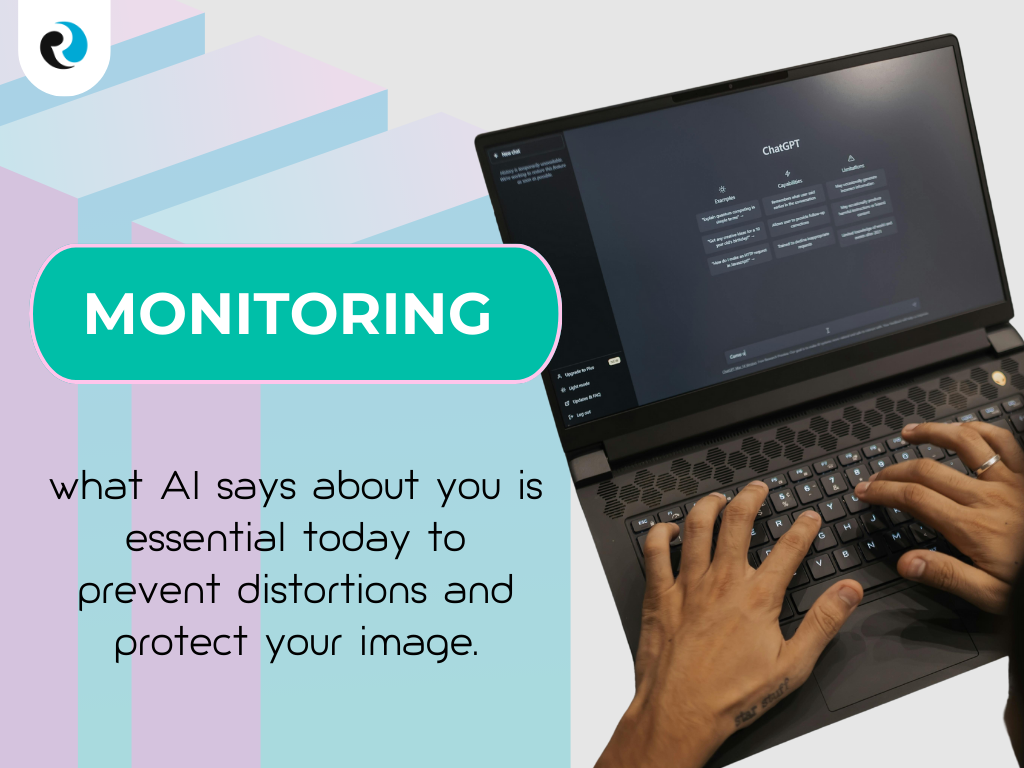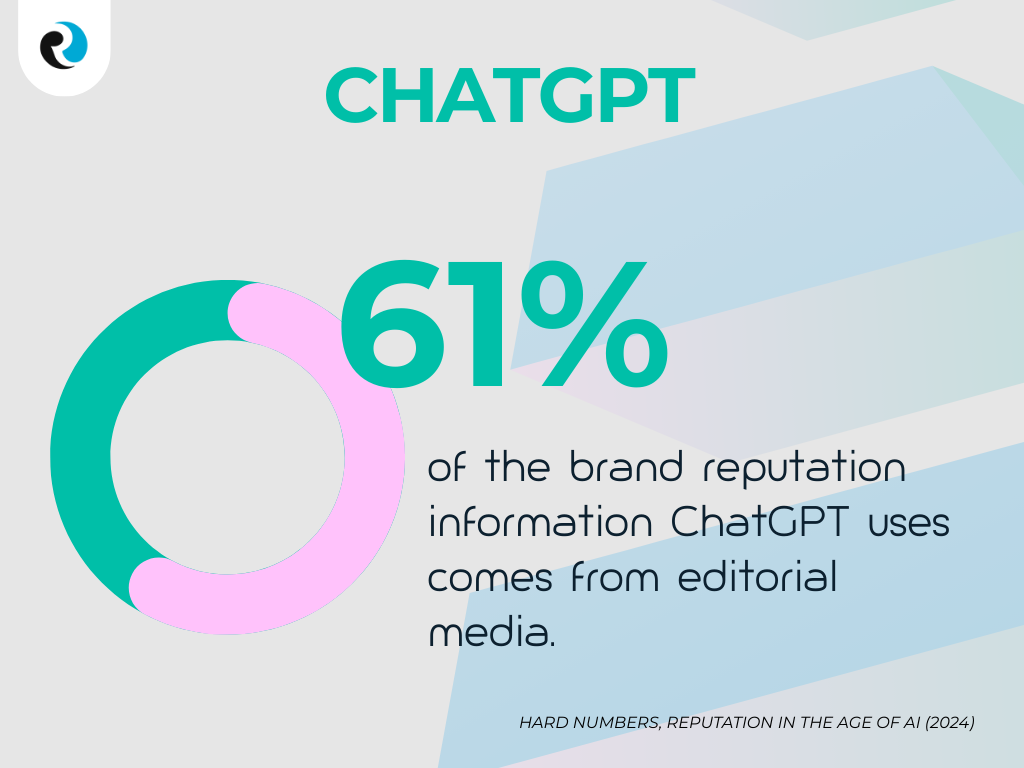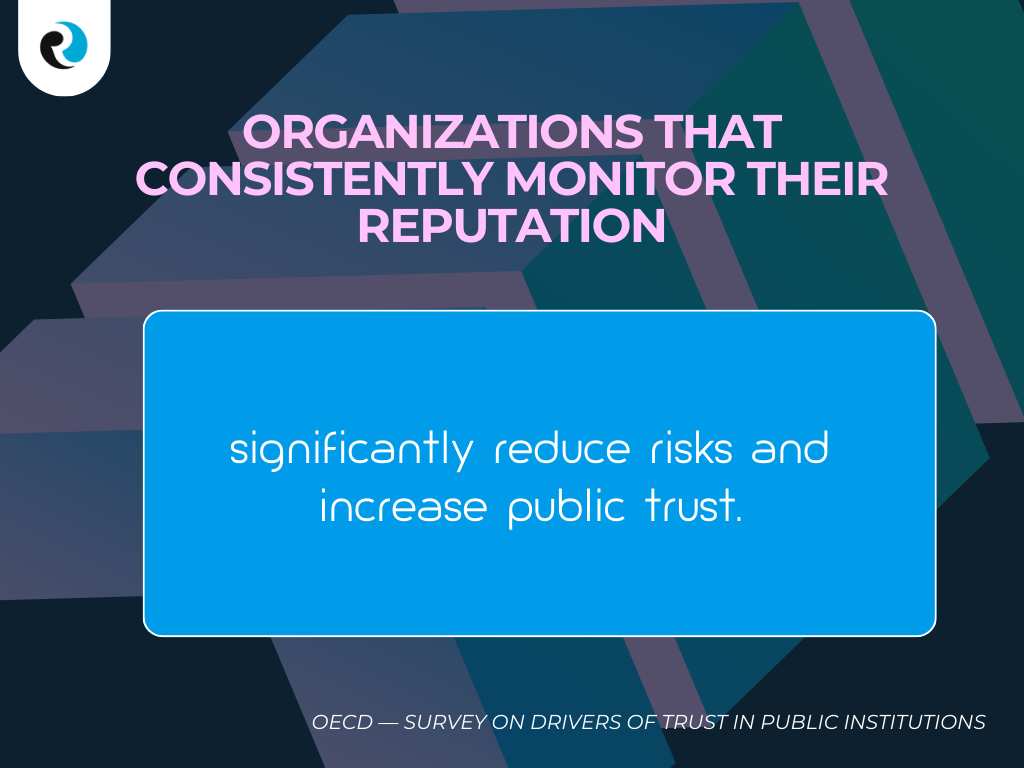In today’s digital landscape, an individual or organization’s reputation is no longer built solely through websites, social media, or reviews, but also through interactions with artificial intelligence systems like ChatGPT. Whenever someone asks something about you—name, company, product—the model could produce a response that reflects what it “found” in the data it was trained on, including any outdated, inaccurate, or unfavorable information.
This new context makes reputation monitoring on ChatGPT not only advisable, but essential: not only to respond to real or perceived attacks, but to prevent falsehoods, distortions, or negative opinions from becoming the narrative that AI offers users.

In this article, we’ll delve deeper into: what this type of monitoring is, why it’s important, how to implement it, regulatory developments with recent, concrete data, and how ReputationUP can help protect and manage your digital reputation in this new landscape.
What is reputation monitoring on ChatGPT?
Monitoring on ChatGPT is the process of verifying, analyzing and acting on the generative mentions that appear when users make inquiries involving you or your organization, shaped by the data the system has “seen.”
These mentions can come from articles published on websites, blogs, forums, and social media, but also from outdated data, controversial opinions, and negative reviews. The AI model can incorporate these elements into its responses in ways that appear “neutral” but aren’t. This is why the context, source, and date of such information must be considered.
“ChatGPT is not a traditional search engine: it builds a narrative. And it is precisely this narrative that influences the reputation of anyone who is cited,” emphasizes Andrea Baggio, CEO of ReputationUP.
Why ChatGPT Really Affects Your Digital Reputation
Denying the importance of interactions with artificial intelligence today means ignoring a radical shift in the way information circulates and is perceived. Every time a user asks ChatGPT for an opinion or information about a brand, person, or company, the system returns a response that can strengthen or damage the credibility of the person quoted.

The conversations generated never remain isolated: they can influence purchasing decisions, professional assessments, personal opinions, and even institutional relationships. In many cases, what AI tells becomes the first point of contact with the public, thus taking on strategic value in building or destroying reputations.
If the information available online isn’t up-to-date, accurate, or well-positioned, the narrative ChatGPT offers risks being incomplete or even distorted. Conversely, a strong and consistent digital presence increases the chances that AI will deliver positive and accurate content, thus becoming an ally for digital reputation.
A report by Percepto (2024) shows that there is actually a correlation between the information that appears in Google and the information that ChatGPT uses in its responses, especially when strong online sources are well-positioned in search engines. If your brand or name doesn’t have a solid presence on the web, AI risks drawing on marginal or inaccurate content.
How reputation monitoring works on ChatGPT
Monitoring on ChatGPT isn’t an abstract activity: it requires concrete methodologies, tools, and consistency. First of all, it’s important to understand that the responses generated by ChatGPT are the result of:
1. What is present in the data used to train the model;
2. How is the question phrased;
3. Which sources are “visible” online;
4. How recent and authoritative these sources are.
Moving forward, effective monitoring includes:
1. Simulated searches and audits: ask questions about ChatGPT that curious or potentially critical users might ask.
2. Source analysis: identify where the AI gets its information. If many responses come from unprofessional sources, forums, or blogs, they’re more likely to contain errors or personal opinions. It’s also important to check the source date.
3. Sentiment analysis and tone: it’s not enough to know what you say, but how you say it: positively, negatively or judgmentally. Even neutral responses can be damaging if they convey insinuations.
4. Regular reporting: this isn’t a one-time action. Regular monitoring practices, documenting responses, changes, and improvements.
5. Proactive intervention: correct errors, update web sources, create content that actively answers common questions, use SEO to push positive and reliable content to the top.
Strategies for protecting your digital reputation on ChatGPT
To defend yourself effectively, simply reacting isn’t enough: you need structured and planned actions. At ReputationUp, we explore how to apply these concretely, not just as theoretical “best practices.”
Before taking any technical or legal action, it’s helpful to understand the kind of public perception you want to build and how AI might reflect (or distort) it.
● Manage and update web sources: ensure that official websites, company profiles, and authoritative articles mention you accurately, up-to-date, and SEO-friendly. If there are errors or outdated information, request corrections.
● Producing quality, positive content: blogs, interviews, case studies, authentic reviews with testimonials. Content that’s well-written, well-referenced, and easily found in Google searches.
● SEO optimization and digital PR: creating content isn’t enough; it needs to be visible. Link building strategies, collaborations, and guest posts on trusted sites, using relevant keywords so AI can “find” them.
● Continuous monitoring and auditing: Create an internal procedure or rely on professionals to conduct periodic audits, ChatGPT testing, and sentiment and source analysis.
“Digital reputation cannot be protected simply by removing negative content: we need to build an ecosystem of positive sources, so that AI can also reproduce the right story,” concludes Andrea Baggio.
What ReputationUP does to ensure your reputation control

ReputationUP is a partner for those who want to not only respond to critical issues, but also build a solid reputation with respect to AI. Thanks to a multidisciplinary team combining legal, technical, and communications expertise, ReputationUP doesn’t just defuse crises, but works to build concrete foundations for the public perception of a name or brand. Here’s how:
● It offers in-depth analysis of digital sources that influence what ChatGPT and other AIs can “read,” evaluating quality, date, and authoritativeness.
● It audits the generative response model by simulating real requests that users might make, to see what appears and how it sounds.
● It offers integrated strategies: content production, digital PR, SEO, optimization of official sources.
● Provides legal and technological support for corrections, requests for removal, or modification of incorrect or defamatory content.
● It provides customized monitoring, reports and alerts: so you can know in advance if something could damage your reputation.
Conclusion
The relationship between ChatGPT (and similar AI models) and digital reputation is becoming increasingly close. It’s no longer just about Google reviews or social media comments, but also what AI returns when called upon to search for answers about you or your brand.
Those who leave the narrative to others risk distorting their first impression, the one many users get. Those who actively build credible, up-to-date, and visible sources, however, can positively influence the reputation AI will offer.
With new European regulations, content and SEO strategies, source and sentiment analysis, and the support of professionals like ReputationUP, it is possible not only to defend yourself, but to use ChatGPT as an ally in building trust, credibility, and digital positivity.
Frequently Asked Questions (FAQ)
Everyone: companies, professionals, public figures, and individuals. Even if you’re not “famous,” if someone asks about you or your field, the AI can return answers based on existing data, whether positive or negative.
There’s no public registry showing exactly which sources the model consults, but you can simulate questions and analyze the answers: check the cited references, plausibility, and date. Analyzing web sources via SEO can also help: if your reliable sources don’t appear in search results, the AI is unlikely to use them.
A lot. If your content is well-indexed, authoritative, and up-to-date, AI is much more likely to “encounter” it in its data and use it to generate favorable responses.
1. Check where it might come from (website, blog, forum, copied content).
2. Request that the source be corrected or removed (if possible).
3. Produced corrective content (articles, press releases, testimonials).
4. If it is defamation or infringement of rights, consider legal support.
It depends on the scope: it can vary depending on the size of your brand/persona, the frequency of monitoring, the number of languages, and the number of sources to be checked. Specialized professionals like ReputationUP can offer customized quotes and packages.

